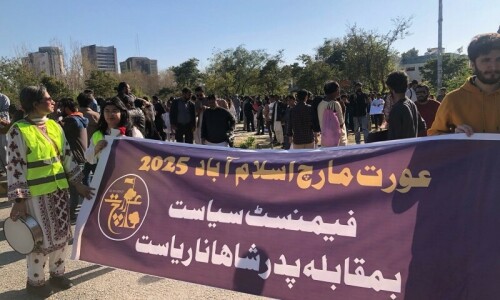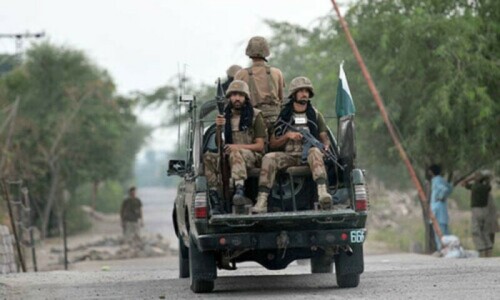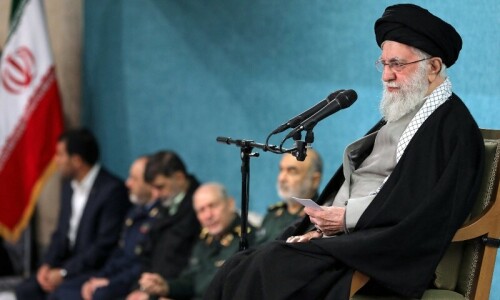LAHORE: Former Punjab food secretary Naseem Sadiq has rejected the federal government inquiry committee’s “Wheat flour crisis inquiry report,” terming it an abortive attempt to save the nexus of the flour mafia and their benefactors by deflecting flour crisis to wheat procurement. He has also sought a judicial inquiry into the matter to unfold the truth.
Mr Sadiq claims that the inquiry committee has attempted to mislead Prime Minister Imran Khan and adds that he will look towards the collective conscience of the system and the authorities to decide its destiny or fate.
Mr Sadiq, who was serving as commissioner Dera Ghazi Khan division, was made the officer on special duty (OSD) on his own request on Monday to allow him to defend himself in the wake of allegations leveled against him.
In his detailed reply written to Punjab chief secretary (made public on Friday), Mr Sadiq has explained his position, stating that the inquiry report was “factually wrong” and substantiated his claims with official documents.
He has leveled allegations against two members of the committee for trying to victimise him. He states that the deputy director-general of Intelligence Bureau (IB) had pressurised him at the highest possible level to withdraw an allotment of an official residence from a judge of Special Anti-Corruption Court, which was under his illegal possession despite being transferred.
Rejects report in letter to CS; seeks judicial inquiry
“Mujhy allotment cancellation order subah tak chaheye,” Mr Sadiq quotes the deputy DG IB as saying.
Referring to another member of the inquiry committee, says he had not spared the official for certain irresponsibility in the past, which is part of the history, known to many.
The former food secretary further says the FIA’s inquiry committee did not fulfill its task of unearthing the flour mafia and fixing of responsibility thereof.
“The report attempts to deflect the attention away from a tangible crime that should have been quantified in no unequivocal terms but conveniently skipped by creating smokescreen in form of an assembly line of scapegoat to give benefit to the mafia involved in the flour crisis (The Actual Crisis), which if allowed to go scot-free, at this juncture, shall again resurface to play havoc, on an unprecedented scale.”
Referring to the allegations raised against him in the report, the former food secretary, in his letter, refutes the allegation of delaying wheat procurement campaign for 22 days. He explains that the wheat procurement campaign had started some eight days before his joining the office on April 16, 2019.
“How I can be held responsible for delaying the campaign for 22 days even before my becoming the food secretary?” he wonders.
Mr Sadiq has made it clear that no delay otherwise occurred at all in wheat procurement in Punjab and factually incorrect information seems to have been intentionally inserted in the report to deceive the prime minister and build a false case of the Punjab government’s failure in wheat procurement – in a bid to help the mafia behind flour crisis go scot-free.
“The committee in its supplementary report did acknowledge that the harvesting season in Punjab starts in middle of April, contradicting its earlier claim of delaying the wheat procurement campaign 2019-20.”
Citing the next allegation in the report that a “tacit approval was given to poultry feed mills to procure wheat”, Mr Sadiq explains that the said permission, rather sale, by the food department was done much before his joining as the food secretary. He explains that the “tacit approval by looking other way” is not possible because there are 36 deputy commissioners who practically, administratively and legally become head of the food department in their respective districts during wheat procurement campaign each year besides other diverse set of highly professionals, including food controllers, DPOs and other officials, managing the wheat procurement campaign.
The FIRs were registered and raids were conducted by respective district administrations to materialise the objectives of Wheat Procurement Campaign 2019-20 and same was duly acknowledged at the Punjab cabinet level, Mr Naseem Sadiq says.
He adds that the Wheat Procurement Policy 2019-20 was approved by the Punjab Cabinet and gave approval for adopting an open procurement regime by removing the bardana etc ceiling, which itself nullifies another allegation quoted in the said report as corruption in bardana issuance.
Mr Sadiq explains that the food secretary is neither competent nor in a position to alter the target set for procurement at his personal level as it has always been a cabinet decision.
He says the cabinet was duly apprised about the procurement of 3MMT wheat by May 23 last year when eight days were left to the closure of the campaign. He stated the market price of wheat was stable and the growers had benefitted from the campaign due to stable price regime.
Though the wheat procurement campaign had to be run till May 31 last year, the Director Food Punjab, after assessment of the field situation, submitted request for formal closure of the campaign, a routine formal practice exercised every year, because the department had procured a reasonable quantity of 33,06,763 MT wheat. However, Mr Sadiq writes, the wheat procurement continued till June 10. The former food secretary reiterates that the FIA’s inquiry report deliberately confused the crisis of flour with wheat to provide leeway to the mafia as the crisis was that of the availability of flour and not of the wheat.
In the end, Mr Sadiq says that he had just touched the tip of the iceberg in his letter, explaining his position to the chief secretary.
When contacted, the chief secretary office stated that it was yet to receive the letter.
Published in Dawn, April 11th, 2020














































